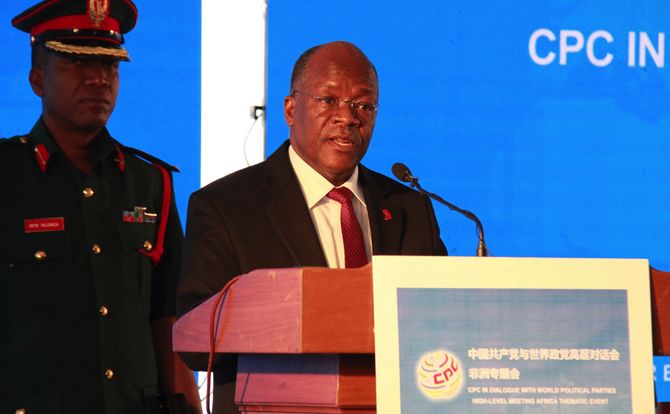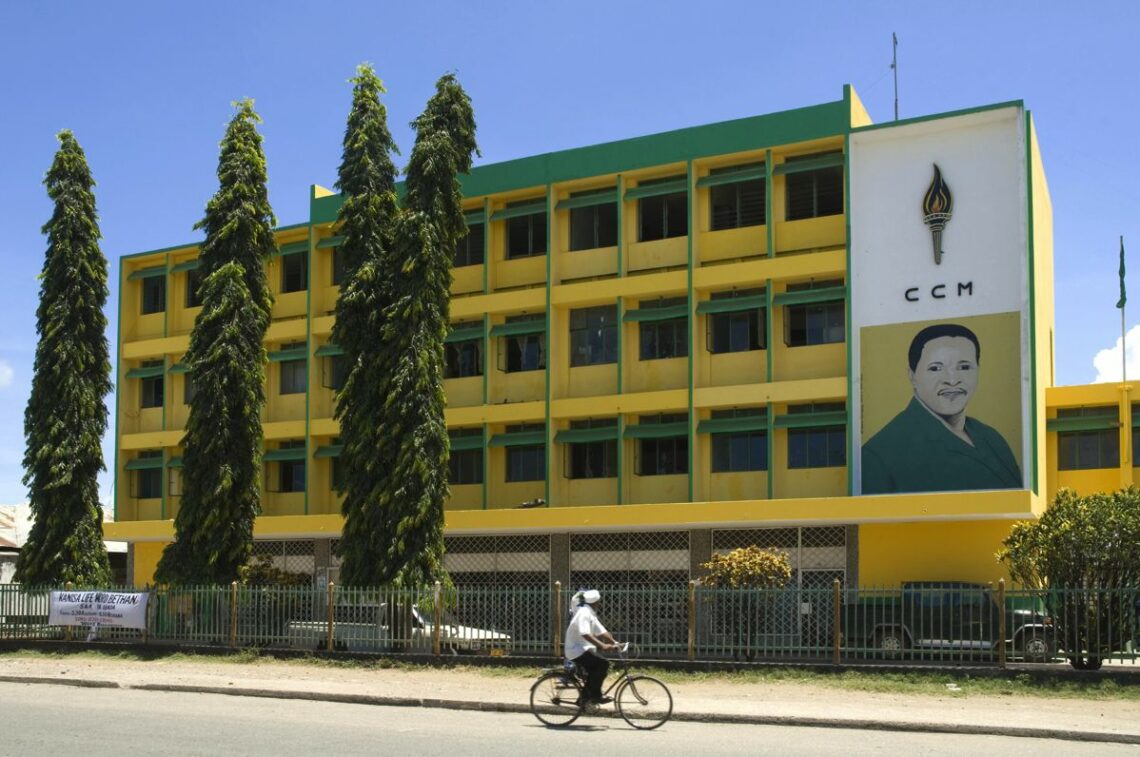Tanzania tries bulldozing its way to growth
President of Tanzania, John Magufuli, seems to have based his rule on an unusual combination of traits: a pugnacious, personalized style of power politics; a statist approach to the economy; and a strong efficiency fetish. While this formula has brought some early successes, it may not be sustainable for long.

In a nutshell
- President John Magufuli has given Tanzania’s declining ruling party a good shake
- He has staked his rule on a Chinese-style anticorruption and industrialization drive
- A big risk is that the president’s heavy-handed style has spooked foreign investors
Before becoming Tanzania’s president in 2015, John Magufuli ran the country’s Ministry of Works under the administration of President Jakaya Kikwete (2005-2015). As a member of the ruling Chama Cha Mapinduzi (CCM, or “Party of Revolution” in Swahili), Mr. Magufuli won a reputation for getting things done and for keeping a low profile during the party’s internal power struggles. His fabled efficiency earned him the nickname “bulldozer.”
Despite the introduction of multiparty politics in 1992 in the so-called “third wave of democratization” and its strict observance of the constitutional limit of two presidential terms since the retirement of President Julius Nyerere (1964-1985), Tanzania remains a dominant-party regime. This is mainly a result of the ruling CCM’s cohesion and tight grip on state institutions (a legacy from Tanzania’s socialist period), the lack of significant ethnic or regional cleavages that would foster the development of strong opposition groups, and the vast patronage networks that connect party members.
However, by 2015, it was becoming evident that like many other “liberation parties,” the CCM was losing strength and popularity. The same trends evident elsewhere on the continent had begun to undermine Africa’s longest-ruling party: changing demographics, fast urbanization, spreading disappointment at regime performance and an increasingly well-organized and sophisticated political opposition.
Even with the CCM in a relatively debilitated state, Mr. Magufuli was able to step smoothly into President Kikwete’s shoes, winning 58 percent of the vote in the October 2015 presidential elections, outpolling CCM dissident and opposition candidate Edward Lowassa, who received 40 percent.
War on corruption
Mr. Magufuli’s ambitions and heavy-handed leadership style would soon become famous inside and outside Tanzania. The hashtag #WhatWouldMagufuliDo went viral on social media feeds throughout Africa, while the verb “Magufulify” gained currency among Tanzanians as a synonym for acting efficiently or cracking down on corruption.
In keeping with his campaign pledges, Tanzania’s new president made the war on corruption and inefficiency his top priority. He cut the number of government ministries to 19 from 30, identified and eliminated from the public payroll more than 17,000 “ghost workers,” and fired over 100 senior officials suspected of bribe-taking and other abuses, including the minister of energy and minerals and the head of the country’s tax authority.
This ruthlessness has already borne fruit: Tanzania improved its ranking in the Transparency International Corruption Perception Index to 103rdout of 180 countries in 2017, 14 spots higher than its 117th-place finish in 2015.
President Magufuli proved his determination by taking on powerful vested interests within the ruling party.
Outside the government, President Magufuli proved his determination by taking on powerful vested interests within the CCM, whose leadership structures are intimately connected with rackets throughout the country. In 2014, several senior party officials were implicated in the Tegeta Escrow Account Scandal, a massive corruption scheme involving the illegal appropriation of an estimated $122 million. However, it remains to be seen whether Mr. Magufuli, whose position had always been marginal in the CCM hierarchy, can afford the political cost of attacking the party leadership head-on.
Efficiency expert
Besides defying senior members of Tanzania’s liberation party, the president has given other signs of breaking with the country’s political tradition. In his first year in power, Mr. Magufuli canceled the Independence Day parade and reception, replacing it with a “National Day of Cleanliness” and transferring the event’s $1.9 million budget to social services.
The sheer symbolism of this gesture was powerful. In a continent where rulers often evoke history as their main source of legitimacy, President Magufuli made the surprising decision to base his mandate on austerity and efficiency. But while curbing waste and corruption are necessary measures to improve economic performance, they are far from sufficient, as can be seen by Mr. Magufuli’s mixed record in office.
The success story has been overall growth. According to the World Bank and the Southern African Development Community (SADC), Tanzania has become the region’s best-performing economy. With 7.1 percent growth of real gross domestic product (GDP) in 2017, it was the only country to meet the SADC’s regional target of 7 percent. But while headline output has been buoyed by an increase in public investment, mostly channeled to infrastructure, the International Monetary Fund notes that other high-frequency indicators of economic activity have begun to weaken – including imports, exports and tax receipts.
Hostile attitude
President Magufuli sets great store by the industrialization drive set forth in the government’s National Development Vision 2025. These plans give manufacturing the leading role in helping Tanzania advance into the ranks of middle-income economies. By 2020, the sector is supposed to be responsible for creating about 40 percent of all new jobs in the economy. According to data from the Tanzania Investment Centre, local manufacturers are already attracting more investment flows, accounting for 50.3 percent of all new investment outlays.
But when it comes to private investment, the picture is less positive. Data compiled by the United Nations Conference on Trade and Development (UNCTAD) show that inflows of foreign direct investment (FDI) decreased by 24 percent between 2015 and 2017, reflecting the country’s more hostile attitude toward foreign investment, excessive regulation and unpredictable business climate. In key industries such as mining, President Magufuli has gotten tough with foreign investors, adopting indigenization principles and raising tax rates. A new law regulating the sector stipulates that the government is entitled to at least a 16 percent stake in every mining venture, with no compensation.

Political consolidation
Another hallmark of the Magufuli administration is the “departification” of political power. The president, who was elected chairman of the CCM in 2017, has appointed Kassim Majaliwa – a relatively junior functionary – to the post of prime minister, while reducing the number of positions in the party’s main organs and the frequency of party meetings.
The regime has also taken steps to centralize power. Live broadcasts of parliamentary debates have ceased, opposition rallies have been banned and the space for dissent and protest has been constricted. One of the key restraints on freedom of expression is the 2015 Cybercrimes Act, which requires citizens to acquire a $930 license if they wish to blog online.
Tanzanian lawmakers are also discussing amendments to the Statistics Act, including possible restrictions on the collection, analysis and dissemination of data without prior authorization from the National Bureau of Statistics. Publication of data intended to “invalidate, distort, or discredit official statistics” would be banned. While the political motivation of these restrictions is evident, they would also harm the Tanzanian economy by compromising data collection and the development of the IT sector, which is becoming an important driver of growth and innovation in East Africa.
Tanzania is seeking closer ties with China, Turkey and some Arab Gulf states as an alternative to Western donors.
At the same time, Tanzania under President Magufuli’s rule is becoming a force to be reckoned with in the region. The country has the largest population and fastest-growing economy in the six-nation East African Community (EAC). It is forging ahead of Kenya as a regional leader, taking advantage of the corruption and political instability that plague the authorities in Nairobi. Mr. Magufuli is also forging closer ties with China, Turkey and some of the Arab Gulf states. This reflects a large tendency on the continent to seek alternatives to traditional Western donors and partners.
Scenarios
With the next elections scheduled for 2020, two main scenarios can be envisaged for Tanzania. Both involve the further centralization of power, but with very different outcomes for the economy.
Consolidation and growth
This first and most likely scenario hinges on the success of Mr. Magufuli’s economic strategy. His industrialization drive could bring positive economic results and even a strong performance from the extractive sector, provided the government moderates its statist approach to accommodate more investment-friendly policies. The potential benefits of this course would also include increased public sector efficiency and deeper integration with the regional economy.
Politically, rising prosperity would allow the president to shore up his support base, despite continuing resistance from the opposition and elements of the population, especially disgruntled public employees. This would also be the surest path to tightening Mr. Magufuli’s still tenuous grip on the ruling party. With his domestic position thus reinforced, the Tanzanian leader would be free to assert himself in the wider EAC region.
Statism and unrest
Under this somewhat less likely scenario, growing tensions between the state and the private sector would curb FDI inflows and economic growth. A toxic mix of centralized power, growing repression and a stagnating economy could very well spur popular unrest and mobilization against the president, as has occurred in many other sub-Saharan countries. Under this scenario, Mr. Magufuli’s leadership would be strongly challenged both inside and outside the CCM, creating a volatile political environment ahead of the 2020 elections.







